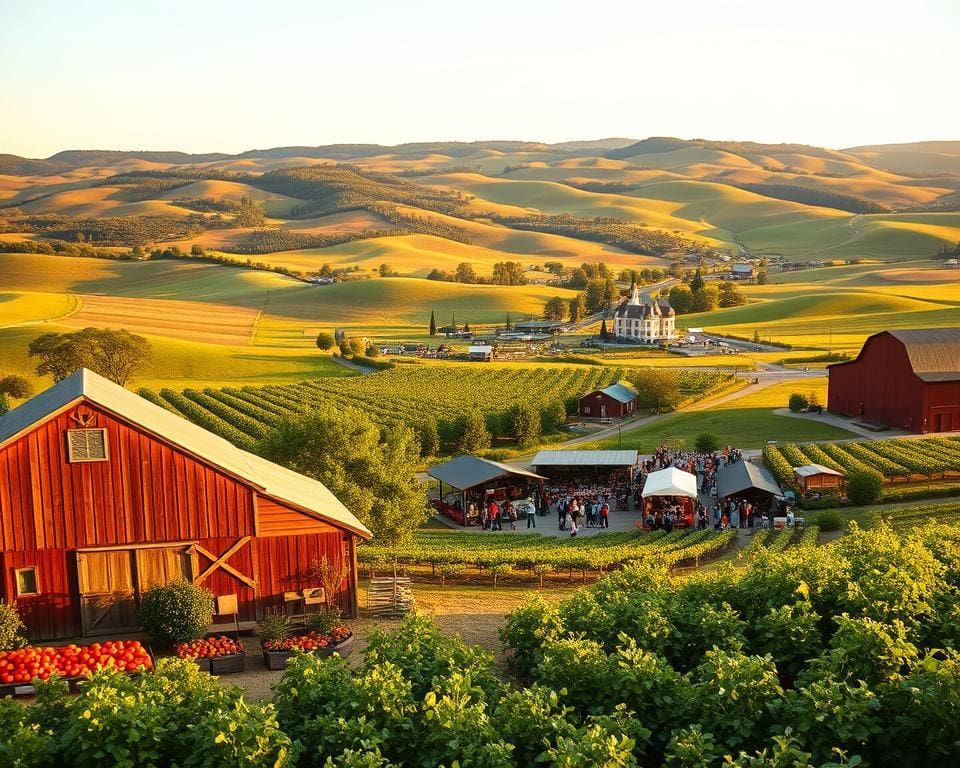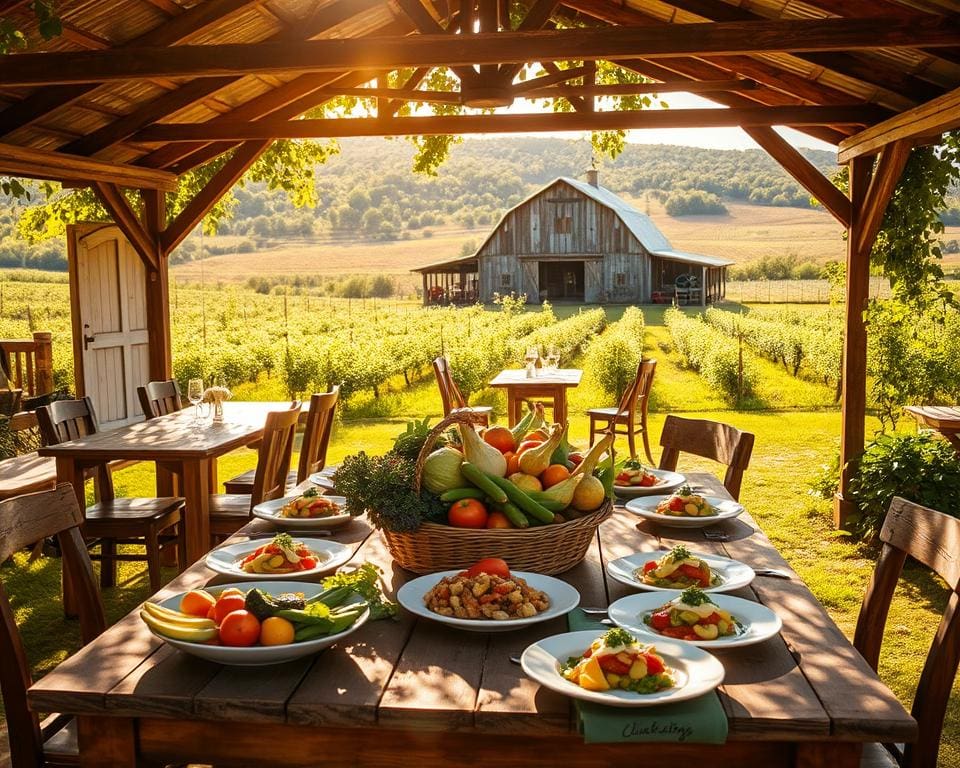In an era where culinary experiences are increasingly interconnected with ethical and environmental considerations, farm-to-table dining has emerged as a transformative approach within the UK culinary scene. This movement champions the use of locally sourced ingredients, prioritising fresh produce over imported alternatives. By spotlighting seasonal offerings, chefs not only enhance the flavours of their dishes but also underscore the importance of sustainability in dining practices. Emphasising community support, this style of dining aligns perfectly with health-conscious values, making it more than just a trend—it’s a lifestyle choice that invigorates our relationship with food.
Understanding Farm-to-table Dining
The farm-to-table movement has captured the culinary world, embracing the notion of local sourcing to create a more sustainable food culture. This approach highlights the connection between consumers and their food, fostering relationships between eaters and producers. Understanding the roots of this movement offers insight into its influence on contemporary dining experiences.
The Origins of Farm-to-table Movement
The farm-to-table movement history reveals a significant shift in how food is perceived and consumed. Emerging in the late 20th century, this concept owes much to pioneering chefs like Alice Waters, who advocated for the use of locally sourced ingredients at her iconic restaurant, Chez Panisse. As diners began to appreciate where their food comes from, a culinary revolution took hold, reshaping the dining landscape.
Why It Matters in Today’s Culinary Scene
In today’s culinary scene, the importance of the farm-to-table ethos cannot be understated. As consumers become increasingly aware of food production processes, local sourcing has gained momentum, empowering individuals to make informed dining choices. By prioritising ingredients grown within their regions, restaurants not only offer fresher meals but also support local economies and encourage sustainable practices.

Benefits of Locally Sourced Ingredients
The journey from farm to table offers numerous advantages, particularly when it comes to utilising locally sourced ingredients. One significant benefit is the enhanced freshness of local produce, which directly influences the overall flavour profile of dishes. Chefs and food enthusiasts appreciate how using such ingredients can lead to remarkable taste enhancement, elevating the dining experience.
Enhanced Freshness and Flavour
Locally sourced ingredients are harvested at their peak, ensuring the utmost freshness. This immediacy allows them to retain their natural flavours and nutritional value, making them far superior to produce transported over long distances. A vibrant flavour profile can truly transform a meal, inviting diners to savour each bite as a celebration of local terroir.
Supporting Local Farmers and Communities
Choosing to incorporate local produce into menus goes beyond taste; it supports local farmers and strengthens the community. By buying directly from nearby growers, restaurants help sustain local economies and reduce environmental impacts associated with transportation. This connection fosters relationships built on trust and mutual benefit, creating a more vibrant food scene.
Seasonal Eating and Sustainability
Embracing the rhythm of seasonal eating encourages chefs and consumers to appreciate the natural world’s cycles. Selecting seasonal ingredients not only enhances the freshness of local produce but also promotes sustainability practices. This commitment to the environment resonates with diners who value the origin of their food and its impact on the planet.
Farm-to-table Dining with Locally Sourced Ingredients
Farm-to-table dining embraces the unique flavours of local ingredients, with chefs weaving seasonal menu planning into their culinary practices. This approach not only celebrates regional produce but also transforms how diners experience food. As ingredients vary throughout the year, menus reflect the best available, creating an ever-evolving landscape of tastes.
Crafting Menus that Celebrate Local Produce
Crafting local produce menus involves a deep understanding of what each season brings. Chefs assess local markets and farms, allowing the freshness of the harvest to inspire their culinary creativity. This process encourages innovation, resulting in dishes that are not only delicious but also meaningful, showcasing the essence of the local area.
Innovative Cooking Techniques
As chefs incorporate seasonal ingredients into their cooking, they often explore innovative techniques that enhance the natural flavours of the produce. Whether through smoking, fermenting, or slow-cooking, each method amplifies the unique characteristics of the ingredients. This creative experimentation fosters a connection between the chef’s artistry and the local environment, highlighting the importance of seasonal menu planning.
Top Farm-to-table Restaurants in the UK
The UK boasts a vibrant landscape of farm-to-table restaurants, where local ingredients take centre stage, elevating the culinary experience. These noteworthy establishments not only prioritise sustainability but also capture the essence of the region’s produce. Here, we explore some of the best farm-to-table restaurants and the unique dining experiences they offer.
Highlighting Notable Establishments
Among the best farm-to-table restaurants in the UK, a few stand out for their commitment to local sourcing and innovative menus. Consider the following establishments:
- The Fat Duck, Bray: Renowned for its creative dishes and emphasis on local produce.
- River Cottage, Dorset: A unique restaurant that merges farming practices with an immersive dining experience, showcasing seasonal ingredients.
- St. John, London: Celebrated for its focus on nose-to-tail cooking and using fresh, local meats and vegetables.
Unique Dining Experiences to Explore
These restaurants provide an experience that transcends traditional dining. Guests can expect to enjoy:
- Interactive cooking classes, where one can learn from skilled chefs who champion local ingredients.
- Farm tours that allow diners to see firsthand the sources of their meals, fostering a deeper connection with food.
- Seasonal tasting menus that highlight the best of what local farms have to offer throughout the year.
The Future of Sustainable Dining
The future of dining is increasingly intertwined with sustainable food practices that reflect a growing societal consciousness around environmental health and local economies. As more restaurants adopt farm-to-table approaches, they are not only enhancing the flavours and freshness of their offerings but also minimising their carbon footprints. The shift towards transparency in sourcing and operations is expected to become a baseline expectation rather than a novelty, encouraging diners to engage with their food in a more meaningful way.
Culinary innovation plays a pivotal role in this evolution. Emerging technologies, such as vertical farming and seasonal hydroponics, are transforming how ingredients are grown and harvested. These advancements allow chefs to work with local produce year-round, regardless of geographical limitations, resulting in a richer, more diverse culinary palette. By embracing these methods, restaurants can ensure that sustainable practices are at the forefront of their operations while also inspiring future generations of chefs and diners alike.









